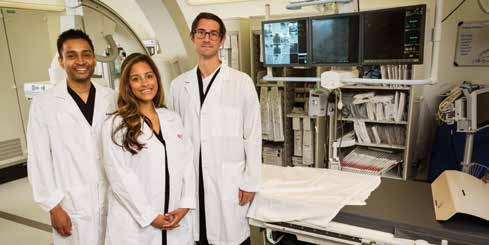Recent advances in imaging technology and minimally invasive techniques have led to the emergence of an exciting medical specialty called Interventional Radiology (IR). With three full-time Interventional Radiologists and two Advanced Practice Registered Nurses, Cooper is home to the largest and most experienced IR team in South Jersey.

Sabina Amin, MD, Head, Division of Interventional Radiology, center, Rohan Amin, MD, PhD, Diagnostic and Interventional Radiologist, left, and Dan A. De Cotiis, MD, Diagnostic and Interventional Radiologist, use minimally-invasive image-guided procedures to diagnose and treat diseases throughout the body.
“Interventional Radiology uses medical imaging to guide catheters, needles, or other devices to a specific site inside the body,” says Sabina Amin, MD, Head of Cooper’s Division of Interventional Radiology. “This minimally invasive approach enables us to diagnose and treat a range of conditions without open surgery—and with less risk and minimal pain for patients so they can get back to their lives faster.”
Some conditions that can be treated with IR:
- Uterine fibroids in women
- Enlarged prostate (benign prostatic hyperplasia, or BPH) in men
- Liver cancer
- Internal bleeding from trauma
Many of these conditions can be treated with a technique called embolization. Under imaging guidance, coils or substances called embolic agents are delivered to the treatment site via catheter from inside a vein or an artery.
“In prostate artery embolization, we access the prostate’s blood vessels via catheter through a small incision in the upper thigh and inject small particles to slow blood flow to the gland, causing it to shrink—and relieve urinary symptoms,” Dr. Amin says. “This avoids the risks of impotence and incontinence, which can occur with conventional prostate surgery.”
Similarly, uterine artery embolization (UAE) is used to treat fibroid tumors that can cause heavy menstrual bleeding, pain, and pressure. Embolic agents block the arteries that supply blood to the fibroids, causing them to shrink.
“In the past, women often had surgery or a hysterectomy to treat fibroids, and recovery took weeks,” Dr. Amin says. “With UAE, the patient is back to her normal activities in a couple of days.”
On the cancer front, Cooper is among the top hospitals in the Northeast performing SIRSpheres Y90 radioembolization, a procedure that combines embolization and radiation therapy to treat primary and metastatic liver cancer. Dr. Amin and her team work with oncologists at MD Anderson Cancer Center at Cooper to provide this state-of-the-art treatment.
Additionally, Cooper has become a regional referral center for its IR expertise in inferior vena cava (IVC) filter retrieval. This highly complex procedure is done to remove a device that is used to help prevent blood clots from traveling to the lungs in patients who can’t take blood thinners.
Interventional Radiology also is used for a variety of more routine procedures, including placement of the ports that are used to administer chemotherapy to cancer patients. IR also is used in performing biopsies, draining infections, performing lumbar punctures, and placing gastrostomy tubes (G-tubes), which are inserted through the abdomen to deliver nutrition directly to the stomach.
“Interventional Radiology is definitely on the forefront of medicine, enabling us to do what simply wasn’t possible previously and in a way that’s much easier on the patient,” Dr. Amin says. “It offers virtually limitless potential to make patients’ lives better.”
To schedule a radiology appointment, call 888.499.8779, or for additional information, visit CooperHealth.org/Radiology.
